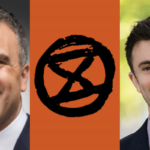Busting the Duopoly: Both Majors Shaking in Their Boots at Prospect of 2025 Election

“We can’t keep voting for the same two parties and expecting a different result,” said Australian Greens leader Adam Bandt at the National Press Club a fortnight ago.
“Labor has lost themselves. People tell us that it is harder and harder to tell Labor and the Liberals apart. They’ve betrayed everyday people by refusing to take on the big corporations’ excessive profits,” the lower house MP made clear.
This “progressive populism” spruiked by Bandt is dangerous, warned Paul Kelly, The Australian editor-at-large last week, as, according to him, it’s threatening “a deeper fracturing of the parliament and a 2025 minority government”, and that’s due to the impact the Greens is having upon Labor, which is not the side of politics that the Murdoch press usually concerns itself with.
“While people are being ripped off by the big supermarkets, the prime minister, just a few weeks ago, was posing for photos in a Coles hi vis vest, which is a level of disconnection with the reality of everyday people that echoes Scott Morrison,” Bandt continued, as he again highlighted that since Albanese took office in May 2022, he hasn’t strayed far from the course set by the Coalition.
Bandt focused on the cost-of-living crisis and the new Greens corporations tax policy that would see big business taxed at 40 percent after $100 million in turnover, but it also touched upon the other realities that are driving the mass turning away from the majors, which began with the “greenslide” of the May 2022 election and included climate and housing, as well as the new addition of Gaza.
Indeed, the ongoing sea change in the constituency’s allegiances that has continued under Albanese has been driven by Labor’s unbridled support for Israel as it’s perpetrated a mass slaughter of civilians, as well as having rendered international law to a nice aspiration, while Labor has also bent in any direction the US has commanded in terms of the dubious AUKUS pact and submarine deal.
Politics for the people
Kelly is warning that Bandt has “long replaced Pauline Hanson as Australia’s most lethal populist” and dubs him “Australia’s version of… Bernie Sanders”, which is despite populist usually being employed these days to demonise right-wing politicians of the Donald Trump ilk, as well as the fact that the Coalition and The Australian have always been quite comfortable with One Nation politicking.
Although Kelly is correct in his use of the term when looking at its original form, as the 1890s US political party known as the Populists was widely known as “the people’s party”, with its chief concern being a political revolution, via the electoral process, to create a fair and equitable society, which wasn’t apparent because of the huge sway that corporations had over the political system.
Bandt is completely clear in his vision of corporations “giving a bit of it back to the public because” that’s who the corporation’s “are making the money off”, and he further pointed out that “not only have Labor refused to take on the big corporations and billionaires”, but the government won’t even dare to “point out the role that big corporations have played in causing the cost-of-living crisis”.
The Greens leader further outlined that the nation has not seriously attempted “a Robin Hood-style corporations tax” since 2010, when then Labor PM Kevin Rudd proposed a super tax specifically targeting the mining industry, which triggered a campaign led by the Murdoch press and the mining industry to see him sacked from office and resulted in him being replaced by Julia Gillard.
“That doesn’t mean it was the wrong thing to do, that is exactly why it needs to be done,” the Greens leader said. “We can’t have the mining industry determining who is and who isn’t running the country and who the country is run for.” And he also raised the fact that not only is the economy geared in this way, but Albanese has approved 23 new coal and gas projects during the climate crisis.
A new voice in politics
But the 2022 election, which saw Labor struggle to gain a majority in the lower house and leave the balance of power to the Greens in the Senate, was not only notable due to the turning away of voters from both majors to the Greens but a mass of constituents also chose to vote for independents, with 12 such pollies now in the lower house and two in the Senate.
And a bloc of these independents is known as the teals. They challenged Coalition politicians in blue ribbon seats, with their point of difference being ardent support for climate action as well as progressive values. And this saw 10 teals voted into the lower house and one into the Senate in 2022. However, some of the teals have been rather disappointing in their support for Israel in Gaza.
The genocide against the Palestinians is the issue that has overwhelmed Australian politics and society for the past eleven months. And the unchecked support both the majors have provided Israel has provided that nation with the ability to continue its genocide in Gaza, which is now turning into a landgrab that involves the West Bank as well. And this has divided our community like never before.
Australia has progressively become a multicultural society over the last 50 years. And Labor congratulated itself on its diverse representation within the parliament following the 2022 election, which had included Fatima Payman, a Muslim senator who represents WA. But despite this diversity, there appears to have been no other option for federal Labor but to support Israel.
In May, Payman called out “our leaders” for “gaslighting” the public on Israel’s military intervention into Gaza, as they’ve been denying its genocidal nature. And so put out was PM Anthony Albanese after Payman going crossed the floor to vote in support of a Greens’ motion on recognising Palestine, that he banned her from the party caucus, and she quit Labor to become an independent in July.
So, the fallout around Labor’s reaction to the Gaza genocide, the controversy over Payman’s treatment by the prime minister and the general disregard that both major parties have shown Muslim constituents over the past two decades in terms of terror laws, militarised refugee policy, the COVID lockdowns and now Gaza, has led to the formation of Muslim Votes Matter.
In response to a question about Muslims in western Sydney forming their own political party put to the PM on 5 July, Albanese said, “I don’t think, and don’t want, Australia to go down the road of faith-based political parties, because what that will do is undermine social cohesion.”
The political group Muslim Votes Matter, however, went on to launch nationally last week in Broadmeadows Town Hall in Victoria, and it outlines that Muslims voting as a collective bloc is the “most valuable, yet underutilised, asset” their communities have, and their purpose is to promote political engagement with Muslim voices and concerns.
“There are over 20 seats where the Muslim community collectively has the potential deciding vote,” the MVM’s website reads.
“Doesn’t sound like much? Well, it is – in the last 25 years no federal government has been elected by a margin of more than 15 seats,” the political advocacy group makes clear.
And Muslim Votes Matter concludes that this means that those of the Islamic faith are in a strategic position to bring issues to the forefront and oppose political forces that ignore them.







